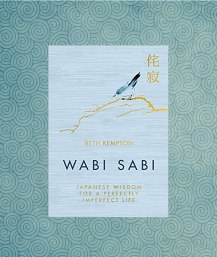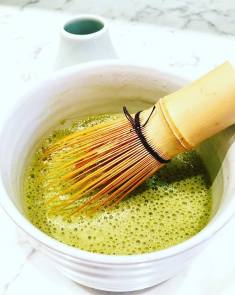
“In traditional Japanese aesthetics, wabi–sabi (侘寂) is a world view centered on the acceptance of transience and imperfection. The aesthetic is sometimes described as one of beauty that is “imperfect, impermanent, and incomplete.”
For April, let’s settle into the notion that there is beauty in imperfection – even tea. This brings us to this months choice for our fourth Book and Tea pairing which will explore these ideas and help us all understand that it’s perfectly ok not to be perfect.
April 2019
• Book 4: Wabi Sabi
• Tea 4: Matcha
Beth Kempton has a Masters Degree in Japanese and has spent many years living and working in Japan. Over the years she has studied papermaking, flower arranging, pottery, calligraphy, the tea ceremony and weaving in Japan. Collectively these experiences have led to a deep love the country and a rare understanding of cultural and linguistic nuances. As founder and CEO of Do What You Love, Beth has produced and delivered online course and workshops that have helped thousands of people all over the world. Her blog was recently named Best Happiness Blogs on the Planet.
Wabi Sabi
 “Wabi Sabi is a whole new way of looking at the world – and your life – inspired by centuries-old Japanese wisdom. Wabi sabi (“wah-bi sah-bi”) is a captivating concept from Japanese aesthetics, which helps us to see beauty in imperfection, appreciate simplicity and accept the transient nature of all things. With roots in Zen and the Way of Tea, the timeless wisdom of wabi sabi is more relevant than ever for modern life, as we search for new ways to approach life’s challenges and seek meaning beyond materialism. From honouring the rhythm of the seasons to creating a welcoming home, from reframing failure to ageing with grace, Wabi Sabi will teach you find more joy and inspiration throughout your perfectly imperfect life.”
“Wabi Sabi is a whole new way of looking at the world – and your life – inspired by centuries-old Japanese wisdom. Wabi sabi (“wah-bi sah-bi”) is a captivating concept from Japanese aesthetics, which helps us to see beauty in imperfection, appreciate simplicity and accept the transient nature of all things. With roots in Zen and the Way of Tea, the timeless wisdom of wabi sabi is more relevant than ever for modern life, as we search for new ways to approach life’s challenges and seek meaning beyond materialism. From honouring the rhythm of the seasons to creating a welcoming home, from reframing failure to ageing with grace, Wabi Sabi will teach you find more joy and inspiration throughout your perfectly imperfect life.”
Matcha
 “The origins of matcha can be traced all the way back to the Tang Dynasty in China. … Eisai, a Japanese Buddhist Monk, spent the better part of his life studying Buddhism in China. In 1191, Eisai returned permanently to Japan, bringing with him tea seeds along with the Zen Buddhist methods of preparing powdered green tea.”
“The origins of matcha can be traced all the way back to the Tang Dynasty in China. … Eisai, a Japanese Buddhist Monk, spent the better part of his life studying Buddhism in China. In 1191, Eisai returned permanently to Japan, bringing with him tea seeds along with the Zen Buddhist methods of preparing powdered green tea.”
Have you tried Matcha? Experienced its duality of both stimulating and relaxing the body, mind and spirit?
Made from tencha leaves that are shaded for at least one month before harvest. The best leaves are plucked carefully from organic tea fields during harvest season, from May – July. Tea leaves are then ground into a powder, but not before the plucked tea leaves are de-stemmed and de-veined, to reduce bitter flavors. The super fine powder is the result of using traditional granite stone grinders to ensure and achieve a high quality finished matcha product that has little to no bitterness.
I hope you decided to join in, find a new book and tea to make you feel joyful and connected. If you don’t already follow us on Instagram, Facebook and Twitter, we hope you will and share your thoughts about the book and the tea.
Tag us if you decide to post any photos of you reading the suggested book, drinking the suggested tea and be sure to use the hashtags:
#12Books12Teas
#PearlFineTeas
Lastly, please consider purchasing your book(s) from a small local independent bookshops. We have a few of these still left in DC.
Happy Reading!
Happy Sipping!
~The Chief Leaf

You must be logged in to post a comment.